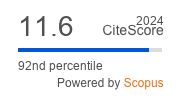A PARALLEL AND PIPELINED ARCHITECTURE FOR CORDIC ALGORITHM
DOI:
https://doi.org/10.29284/ijasis.5.2.2019.23-31Keywords:
CORDIC Algorithm, parallel and pipelined method, Xilinx tool.Abstract
The COordinate Rotation DIgital Computer (CORDIC) algorithm is an efficient algorithm to calculate the iteratively phase and magnitude or the vector rotations in linear, hyperbolic and circular coordinate system. The existing CORDIC method takes less clock frequency with high delay. To overcome this problem, a new version of updated parallel and pipelined architecture is designed without degrading the performance. It provides highest maximum frequency with less delay by splitting the critical path into several smaller delay paths with enhanced circuit processing time. The designed architecture in this study can be used in navigation application. This method is implemented in the Xilinx ISE tool.
References
K. Maharatna, S. Banerjee, E. Grass, M. Krstic, and A. Troya, “Modified virtually scaling-free adaptive CORDIC rotator algorithm and architecture”, IEEE Transactions on circuits and systems for video technology, Vol. 15, No. 11, 2005, pp.1463-74.
E. Antelo, J. Villalba, J.D. Bruguera and E.L. Zapata, “High performance rotation architectures based on the radix-4 CORDIC algorithm”, IEEE Transactions on Computers, Vol. 46, No. 8, 1997, pp. 855-70.
J. Li, J. Fang, B. Li and Y. Zhao, “Study of CORDIC algorithm based on FPGA”, IEEE Chinese Control and Decision Conference, 2016, pp. 4338-4343.
A. Tang, L. Yu, F. Han and Z. Zhang, “CORDIC-based FFT real-time processing design and FPGA implementation”, IEEE International Colloquium on Signal Processing & Its Applications, 2016, pp. 233-236.
S. Aggarwal, P.K. Meher and K. Khare, “Concept, design and implementation of reconfigurable CORDIC”, IEEE Transactions on Very Large Scale Integration Systems, Vol. 24, No. 4, 2015, pp. 1588-92.
X. Zhang, X. Zhao and B. Zhou, “The Design of Direct Digital Synthesizer Based On Cordic Algorithm and FPGA Implementation”, International Conference on Computer Engineering, Information Science & Application Technology, 2016, pp. 98-103.
J.M. Mehta and P. Trivedi, “An enhanced mixed-scaling-rotation CORDIC algorithm with weighted amplifying factor”, IEEE International Conference on Digital Signal Processing, 2016, pp. 527-531.
X. Xiao, E. Oruklu and J. Saniie, “Reduced memory architecture for CORDIC-based FFT”, IEEE International Symposium on Circuits and Systems, 2010, pp. 2690-2693.
G. Zhang and F. Chen, “Parallel FFT with CORDIC for ultra wide band”, IEEE International Symposium on Personal, Indoor and Mobile Radio Communications, Vol. 2, 2004, pp. 1173-1177.
H. Huang and L. Xiao, “CORDIC based fast algorithm for power-of-two point DCT and its efficient VLSI implementation”, Microelectronics Journal, Vol. 45, No. 11, 2014, pp. 1480-1488.
Y.T. Lin, P.Y. Tsai and T.D. Chiueh, “Low-power variable-length fast Fourier transform processor”, IEEE Proceedings-Computers and Digital Techniques, Vol. 152, No. 4, 2005, pp. 499-506.
A.P. Renardy, N. Ahmadi, A.A. Fadila, N. Shidqi and T. Adiono, “FPGA implementation of CORDIC algorithms for sine and cosine generator”, IEEE International Conference on Electrical Engineering and Informatics, 2015, pp. 1-6.
W. Cui, H. Chen and Y. Han, “VLSI implementation of universal random number generator”, Asia-Pacific Conference on Circuits and Systems, Vol. 1, 2002, pp. 465-470.
J.M. Muller, “The CORDIC Algorithm”, Elementary Functions, 2016, pp. 165-184.
N. Das, S. Jena and S.K. Panda, “FPGA implementation of Angle Generator for CORDIC Based High pass FIR Filter Design”, IOSR Journal of Electronics and Communication Engineering, 2016, pp. 1-11.
Downloads
Published
Issue
Section
License
This work is licensed under a Creative Commons Attribution 4.0 International License, which permits unrestricted use, distribution, and reproduction in any medium, provided the original work is properly cited.











